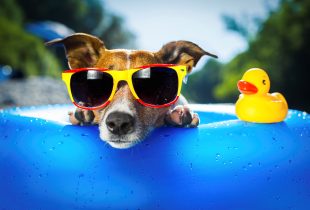Latest News
EASTER CHOCOLATE
With Easter approaching us we thought it was a good time to discuss all things CHOCOLATE!
Our furry friends might be tempted to sneak some of our tasty chocolate treats – however chocolate is toxic to dogs and cats.
Different types of chocolate contain different amounts of theobromine (which is a stimulant a bit like caffeine). Dark chocolate contains the most theobromine making it more toxic in smaller amounts.
If your pet has snuck some chocolate treats’ please call us as soon as you realise, don’t wait to see how badly they are affected. The signs of toxicity don’t develop immediately but can take up to 12 hours.
If the chocolate has been eaten recently, we can usually make your pet vomit to bring up the chocolate and therefore limit the toxin absorption. It is better to decontaminate (vomit!) quickly rather than risk the development of more severe symptoms.
It is important to tell us what TYPE and the approximate AMOUNT of chocolate your pet has eaten – we can then calculate the “toxic level” and plan appropriate treatment.
HOT CROSS BUNS are also something to consider keeping away from your pets. Raisins and Sultanas can be potentially poisonous to our canine friends. The toxic dose varies from dog to dog, but in some cases can be very small amounts (ie some dogs’ don’t have to eat much of the fruit to become poorly).
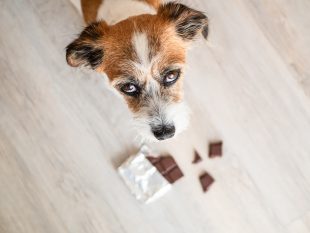
Congratulations Dr Sarah
Congratulations to Sarah and Max on their gorgeous new arrival earlier this year!
Mark is being a great big brother to his new sister Violet.
We all look forward to some cuddles with Violet when she pops in for a visit.
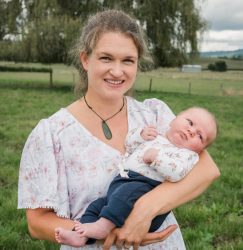
Storm the Blue Heeler
Storm is a handsome Blue Heeler, also known as an Australian Cattle Dog. The Australian Cattle Dog is a breed of herding dog developed in Australia for droving cattle over long distances across rough terrain. Bred to perform demanding tasks, the Australian cattle dog is extremely alert, intelligent, watchful and courageous. These dogs are highly energetic and require ample opportunities for exercise.
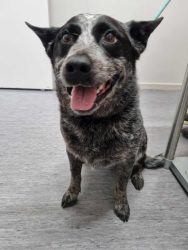
These cute little brothers were full of cuddles when they came for a visit recently.
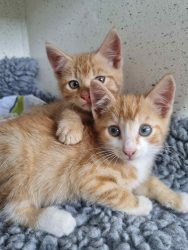
Ted the Jack Russell Terrier
This distinguished wee fellow is Ted. Ted is a Jack Russell Terrier puppy. Lively, energetic, smart and friendly. The Jack Russell Terrier is a well-known family pet. They may be small and adorable, but they pack lots of personality into their compact body. Originally a working dog, they have plenty of energy and stamina, backed by intelligence and an ability to learn fast.

Pipsqueak is a beautiful ragdoll. The ragdoll cat is possibly the most laid back of all the domestic cat breeds. These cats are basically content, undemanding and will tolerate most situations. They have an extremely gentle and relaxed nature and make loyal and devoted pets.
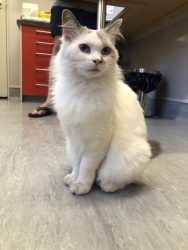
5 Steps to Healthy Paws
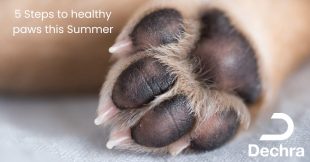
Cool, Calm and Collected
Grayson and Asha were very happy to relax while vet Susan got their vaccinations ready at their last visit. They stay cool calm and collected, which is what we strive for with all our patients in clinic.
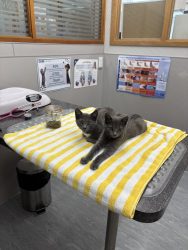
Welcome back Kylie
We are very happy to welcome Kylie back to the team after having her beautiful wee girl Emma. She has slotted back into Vet life like she has never left. We are loving having her back as we know the clients are too.

Vet visits and information
We understand that when you have a consultation with the vet, sometimes a lot of information and advice is given in a short pace of time. It’s no wonder sometimes you get home and can’t remember all we have said.
Did you know you can request to have your clinical records sent to you via email. It will have all the details of the examination, and the vet’s advice and suggestions for treatment.
Just let us know if we can help.

True or False
DOGS ONLY SEE IN BLACK AND WHITE
FALSE – Dogs can see in colour but are comparable to a human with colour blindness. Blue and Yellow toys are the brightest for them.
RABBITS SHOULD ALWAYS EAT CARROTS
FALSE – Carrots are high in sugar and should only be eaten sparingly. 85% of a rabbit’s diet should be hay and grass.
YOU CAN’T TEACH AN OLD DOG NEW TRICKS
FALSE – Yes it may take more time but with continuous training, new tricks are possible.
DOGS SWEAT THROUGH THEIR PAW PADS
TRUE – Merocrine glands which are located in the paw pads and nose produce a small amount of sweat to help cool them down.
RABBITS HAVE 360 DEGREE VISION
FALSE – Rabbits can nearly see 360 degrees, they have large eyes that are positioned high and on the sides of their heads which allows them to see all around. They do have 2 small blind spots – the first is right in front of their nose and the second is immediately behind their head.
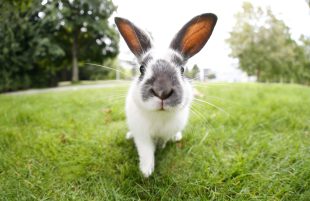
Vaccinations
Vaccinations against disease are critical for our pets’.
Vaccines assist a dog’s own immune system in building defence to disease.
A series of initial vaccinations and regular booster vaccinations are needed to protect your puppy or adult dog.
The 5 diseases we can protect against with vaccinations are:
- Canine Parvovirus (Parvo)
- Canine Distemper Virus
- Infectious Canine Hepatitis
- Leptospirosis
- Canine Infectious Respiratory Disease (Canine Cough)
Check with us today to make sure your pet is protected.
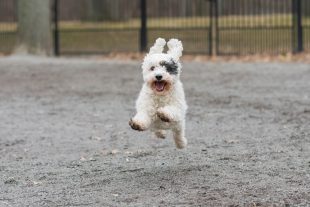
Adorable Penny…
Adorable Penny came and visited for some socialising.
It is important to bring your new puppy into the vet clinic for some positive experiences.
The nurses are always happy for some cuddles and to give some treats. This will make visits in the future much easier for both you and your dog.
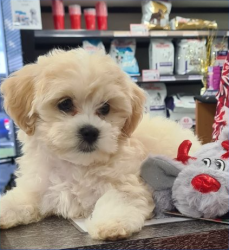
How to Wash your Pet
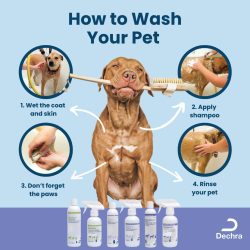
Meet Gypsy May
Gypsy was found under the bonnet of a car by a member of the public. The car had recently travelled from Te Aroha and various stops throughout Matamata. Gypsy was hyperthermic so we immediately started cooling treatment. Once her temperature came down, she was a happy young girl!
Gypsy was recognised via a post on social media and lives in Te Aroha! She was collected from the clinic and microchipped, so it she goes travelling again all clinics will be able to now identify her!
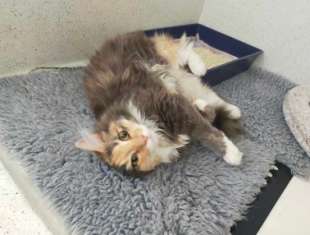
If you find a fledgling:
OBSERVE it from a distance, as being on the ground can be normal while it learns to fly, with parental support likely nearby.
ASSESS if the fledgling is injured or in danger to determine if intervention is needed.
LIMIT HANDLING and only touch te fledgling if absolutely necessary, using gentle methods.
REUNITE it with its parents by placing it in a safe, sheltered location if possible.
KEEP PETS AWAY to avoid stress or harm to the fledgling.
MONITOR the situation to see if the parents return to care for the bird.
CONTACT PROFESSIONALS for help if the fledgling is injured or seems abandoned.
AVOID FEEDING it, as fledglings have specific dietary needs best met by their parents.
Typically, fledglings can survive and learn to fly with the help of their parents.
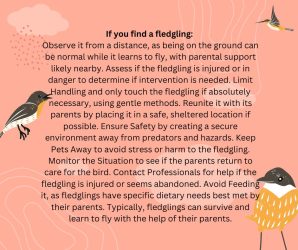
Visiting a vet clinic – just for fun
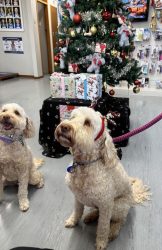
Fibor: Advanced Digestive Support for Pets
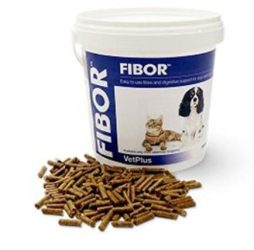
Karaka Berries

Hot Concrete
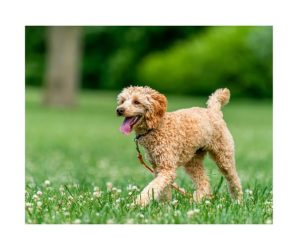
Maternity Leave
We would like to take the opportunity to let you know that Veterinarian Sarah is going on maternity leave at the end of December. We would like to wish her and Max all the best for baby number two. We will all (including clients) miss Sarah greatly while she is away on maternity leave.
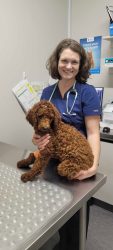
Congratulations
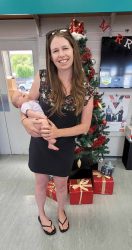
Team work makes the dream work
Dougal presented inappetent, unsettled and not himself. On clinical exam a very large bladder was found suggesting that he had become ‘blocked’ which is a life-threatening emergency. Dougal was admitted immediately and radiographs revealed that he had stones (aka uroliths) in his urethra and bladder. Uroliths in male dogs are especially risky because they have a narrow urethra (the tube via which urine exits the bladder) and a bone within the penis known as the os penis – this can cause uroliths to get stuck.
Dougal had a procedure to unblock the bladder and then surgery to remove the stones, known as a cystotomy. The uroliths were sent to Minnesota Urolith Centre to determine their mineral composition. Dougal’s uroliths were comprised of ammonium urate which only occurs in ~5% of cases and are usually the result of one of two main underlying causes – genetics or abnormalities with the liver vessels.
A bile acid stimulation (BAS) test was performed to test liver function, and the result suggested an abnormality in his liver. Dougal was then referred to the internal medicine specialists at Auckland Referral Centre (ARC) where he underwent a CT scan which identified a liver shunt – this is an abnormal vessel causing blood to bypass the liver. The liver is very important for detoxification of the blood; because toxins were not being eliminated appropriately this lead to a build-up of ammonia and consequently the uroliths. Other clinical signs include stunted growth, gastrointestinal signs and in worst cases seizures.
The specialist soft tissue surgeons at ARC then performed an intricate surgery to tie-off the abnormal vessel. We recently repeated the BAS test which showed that Dougal’s liver is now functioning normally. Dougal has been a star patient and loves coming to the practice and getting lots of attention from our wonderful staff.
We would like to take this opportunity to thank the amazing team at Auckland Referral Centre for their assistance and support with this case; and also to thank Dougal’s owners for entrusting us with his care.
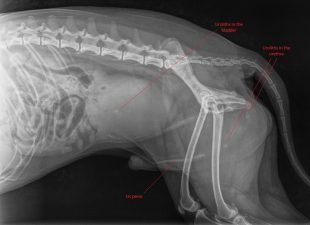

Fireworks tips for your pets
While Guy Fawkes night, and the week leading up to and following, can bring joy to many children and adults alike, unfortunately the same cannot be said for many of our pets.
Every year we speak to concerned pet owners about ways in which we can help our pets through this challenging time, and we do have some helpful tips and products at our disposal.
- Keep your pets indoors for the evenings with cat and dog doors closed for the night, or as much of the night as your pet will allow. Pulling all curtains early on so pets cannot see the fireworks can also help.
- Make sure dogs are wearing their collars (with registration tag attached) and all contact details are up to date if pets are microchipped, in case they should escape. If your pets are not microchipped and you are on the fence about it, it is a good time to get in and get it done.
- Putting on the TV or radio early in the evening can help to muffle the noise of the fireworks however don’t have it so loud as to unsettle your pets if they aren’t used to it.
- Providing a covered crate, igloo, cardboard boxes or a safe hiding spot for pets to retreat to can help.
- Providing a new toy or treats as a distraction.
For some pets, the above preparations are not enough to help and that’s where shop products and/or medication can be of assistance.
- Calmex – This is an oral calming supplement that can be purchased in the shop for both cats and dogs. It is safe for long-term use and we recommend purchasing and trialing for a couple of days prior to the first lot of fireworks so dose rates can be altered if needed. More information can also be found – https://www.vetplus.co.uk/products/calmex-2/
- Feliway and Adaptil – These are pheromone sprays, infusers and collars that assist in creating a calming, secure environment for your pet. Our nurses are always happy to discuss these in depth to help choose the right product for your animal. More information can also be found – https://www.ceva.com.au/Products/Companion-animals/Behaviour
- Thundershirts – These are tight shirts worn by your pet in periods of stress. They provide gentle, constant pressure to calm all types of anxiety, fear, and over-excitement, much like swaddling a baby. More information can be found – https://thundershirt.co.nz/
- Medication – Our vets are always more than happy to see any pets who struggle through Guy Fawkes each year or those which have a nervous disposition, to see if medication is a suitable option. Please do not hesitate to call the clinic to discuss this option with one of our nurses.

Farewell TB
Something in the water at the MVS Small Animal Clinic?
The time has come again for us to farewell Vet Nurse Toni as she heads off to welcome a second little one to the family. Toni and Chris are incredibly excited to be adding to their family and we are sure Amelia is going to make the best big sister. We wish them all the best and can’t wait for some newborn cuddles soon.

Mycoplasma Haemofelis
Albie was presented to MVS Small Animals as he wasn’t eating as many biscuits as normal, wasn’t hunting like usual and was sleeping a lot. When we examined him, we found he had lost weight, had pale gums, and had an increased heart and breathing rate.
We decided that we needed more information to try and pinpoint exactly what was going on with Albie. This uncovered that he was anaemic (had less red blood cells than normal) and had a blood parasite called Mycoplasma Haemofelis. This parasite attaches to the red blood cells and the body destroys the cells as it fights the infection.
Albie was a very sick cat but once we knew what was wrong with him we could start treatment. He was started on a long course of the antibiotic Doxycycline to directly kill the parasite, and the steroid prednisolone to stop the body from attacking its own red blood cells. Albie was given intravenous fluid therapy, and was syringe fed by both the MVS nurses, and then his committed parents over the next 2 weeks as he slowly recovered.
Mycoplasma Haemofelis is thought to be spread by fleas, mosquitos or ticks, or can be spread by infected cats fighting and biting each other. So, the best thing you can do to try and prevent Mycoplasma infection is to be vigilant with flea treatment and try and prevent cat fights.
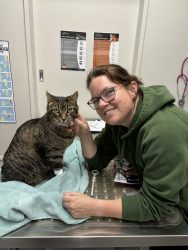
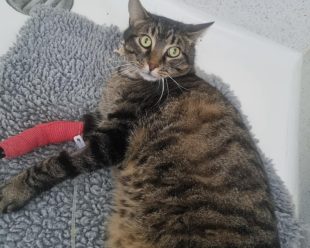
Unusual skin condition – in the words of Baz Lurhmann ‘wear sunscreen’
Handsome man Mac came to us for a second opinion for a non-healing sore nose. Dr Charlie took some samples to look at in house and started him on a course of antibiotics to see how well he responded and also prepare him for biopsies of the nose to be taken under general anaesthetic.
With the help of our wonderful SVS laboratory pathologists and some extra help from dermatologists overseas, a working diagnosis of Discoid Lupus Erythematosus was made. This condition is caused by the body attacking its own cells (immune mediated) and exposure to sunlight is thought to be a possible trigger. Most commonly it effects middle aged long-nose breeds such as Collies, German Shepherds and Huskies; and can affect a few different areas including the nose, eyes and lips. With the nose in particular the main clinical signs are changes in pigment colour, scaling and ulceration which can be quite painful.
Fortunately for Mac his owners were very keen to try the best treatment options for him and he was started on a topical immune modulating cream as well as daily pet sunscreen.
One month after treatment Mac is showing a vast improvement and although it may take a long time for the colour to return to normal (if ever) the ulceration is all but gone and he is a very good boy for his daily cream applications.
We love seeing Mac for his check-ups and he always seems happy to see us too!
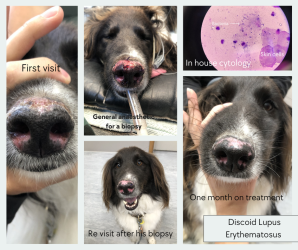
Farewell Sophie
It is with great sadness that we are farewelling our wonderful vet Sophie. Sophie has been a much-loved member of our team for the last year and a half and has made special bonds with many of our clients and their pets in that time.
Sophie’s highlights from her time with us have been some of the more complex cases and surgeries she has been involved with, but she has also found it rewarding working more routine care cases as well. She has loved the small-town community feel of Matamata and meeting all the wonderful clients that call it home. Sophie came to MVS Small Animals as a new graduate and has appreciated the support of the entire team in finding her feet in this challenging but exciting profession.
We would like to wish Sophie all the best in her new role, we know she is going to achieve great things.
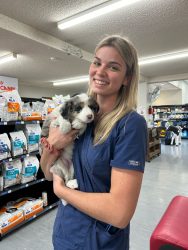
Temporary Closure of Late Nights
From the 24th of June, MVS Small Animals will not be running the late-night Thursday clinic (5-7pm) for a couple of months.
We apologize in advance for any inconvenience this may cause. Saturday morning consults will still run as per normal (8.30am – 12.00pm).
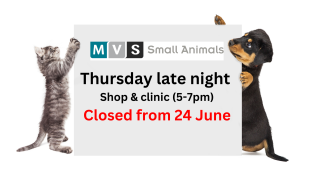
Summer safety for our pets
With the arrival of long sunny days, it’s a good time to touch upon some points to help our 4-legged family members stay comfortable and safe this summer.
Unfortunately, we tend to see an increase in heat stroke cases over the summer months. There can be a few contributing factors but the main causes we see are pets being left in vehicles and pets exercising in the heat of the day. Heat stroke can progress very quickly and is, in some cases, fatal.
By following some simple guidelines, we can decrease our pets’ chances of overheating.
- NEVER leave your pet alone in a parked car, even if temperatures feel tolerable to you. Temperatures rise in parked cars incredibly quickly and our pets have minimal abilities to sweat and cool themselves down, resulting in increased panting and subsequently, overheating.
- Exercise pets in the morning or evening when temperatures are cooler and if possible, stick to shaded areas.
- Always provide clean, fresh water both inside and outside and if possible, take water on walks.
- Provide access to as much shade as possible if dogs are outside – trees, kennels, garage, porch etc.
- Provision of a paddling pool. The clam shell pools are great, even for larger dogs that cannot lie in them. Dogs can cool down quickly via cooling their paws so many large dogs also enjoy simply standing in cold water.
